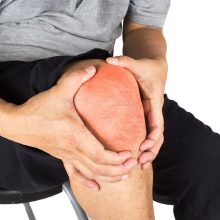Don’t Believe It! Milk Does NOT Do A Body Good
If you’re like me, you probably remember the 1980s TV commercial – Milk: It Does A Body Good. It was launched by the National Dairy Board to promote dairy milk as the key to strong bones, healthy joints, and an attractive body.
Then in the 1990s, we saw the Got Milk? commercials touted by mustachioed celebrities promoting the wonders of milk consumption for “strong” bones.
But this is false advertising. Why? Because research proves that the calcium in milk does not build strong bones.
Scientist Walter Willett, Ph.D., Chairman of the Department of Nutrition at the Harvard School of Public Health, and T. Colin Campbell, Professor Emeritus of Nutritional Biochemistry at Cornell University, stated that based on published research, boosting calcium intake will not prevent fractures. Instead, it weakens bones and increases fracture risk.
The large Nurses’ Health Study, which looked at risk factors for chronic diseases in 122,000 women, found that women with the highest calcium consumption from dairy products had substantially more fractures than women who consumed less dairy.
Here’s more proof . . .
In analyzing 15 large studies (called a meta-analysis), New Zealand researchers discovered that people who took 500 mg of calcium supplements daily for one year had a greater risk of heart attacks than those who did not take calcium.
Another study showed that adding vitamin D to calcium may make the problem worse. That was the finding reported by the journal Heart. The study followed 24,000 German people, ages 35 to 64, for over 11 years and found an 86 percent increase in heart disease when they supplemented vitamin D (800 units per day) with calcium (over 1,100 mg per day).
What’s alarming, notes Dr. Robert Thompson, co-author of The Calcium Lie II, is that food and beverage companies are adding calcium to many of their products because they believe in the old-school, outdated “we-need-more-calcium-to-build- strong-bones” mentality touted by the medical profession. Hence, we find calcium added to soy milk, orange juice, baby food, cereals, pasta, and other food products.
The Calcium Myth
Dr. Thompson says calcium is indeed important for bone health. But it’s just one piece of the puzzle.
Contrary to popular belief, Dr. Thompson dispels the myth that loading up on calcium supplements and consuming calcium-rich foods and drinks will automatically give us strong bones. He argues that too much calcium can do more harm than good.
“We are all victims of health lies. These lies, held with an almost religious zealotry, are quite literally killing us.”
For that reason, Dr. Thompson challenges the conventional wisdom surrounding calcium and bone health. He emphasizes repeatedly in The Calcium Lie II the misconception propagated by the medical community – and their obsession – that increasing calcium intake is the sole solution to prevent osteoporosis and maintain bone strength.
He declares that the scientific evidence points to the fact that “our bones are made of at least 12 minerals, including calcium, and we need all of them in proper proportions to have healthy bones and a healthy metabolism. This is a “no-brainer” found in every biochemistry textbook, and yet we are all programmed to believe that we need calcium.
“I’ve repeatedly encountered doctors who tell me they are going to continue to recommend calcium and the calcium-elevating hormone vitamin D to their patients, even after they are reminded of the basic biochemistry of our bodies,” Dr. Thompson remarks.
“In completing a medical education, the average physician has taken at least four to six-hour courses in chemistry, organic chemistry, and biochemistry. This is sufficient for every single one of them to understand far more than the essentials of biochemistry and human physiology. But for some reason, doctors choose to be programmed, to quit thinking, to conveniently “forget” or simply not to absorb these scientific truths,” he adds.
Dr. Thompson’s work sheds light on the critical role of mineral balance and the detrimental effects of disregarding the significance of other essential minerals in bone health. By debunking the myth of calcium as the ultimate answer, he encourages a comprehensive approach to bone health that considers the intricate interplay of various minerals for optimal skeletal strength.
Understanding Bone Composition
Bones are dynamic and living tissue in our bodies, composed of not just calcium but a complex combination of 12 essential minerals and more than 60 trace minerals. While calcium plays a role in bone health, it’s just part of the equation.
Achieving optimal bone health goes beyond calcium intake and involves maintaining a delicate balance of all necessary minerals. The mineral balance is crucial for ensuring the strength and resilience of our bones to support overall health and well-being.
Calcium’s Impact on Health
Calcium is often touted as a crucial mineral for bone health, but its effects on overall health go beyond just bone strength. Let’s delve into how calcium can impact different aspects of your health.
Calcium and Arterial Health
Excessive intake of calcium can have unintended consequences on your arterial health. When there is an imbalance in calcium levels in the body, especially from supplements, it can lead to the accumulation of calcium in arteries, a process known as arterial plaque formation.
This buildup of calcium deposits can result in hardening of the arteries, increasing the risk of cardiovascular issues such as heart disease and stroke. As Dr. Thompson frequently notes, calcium is used to harden concrete. For that reason alone, it’s essential to maintain a balance in calcium intake to prevent these adverse effects on arterial health.
Osteoporosis Risk and Calcium
Contrary to popular belief, an excessive amount of calcium in the body does not always translate to stronger bones and a reduced risk of osteoporosis. An imbalance in calcium levels can paradoxically contribute to the development of osteoporosis.
Dr. Thompson makes this point crystal clear: “Osteoporosis is defined as a loss of minerals from the bones, not a loss of just calcium.”
When there is too much calcium and not enough other essential minerals like magnesium, manganese, silicon, boron, and sodium, the body may extract calcium from the bones to maintain equilibrium, weakening the bone structure over time. This mineral imbalance underscores the importance of a holistic approach to bone health, focusing on adequate intake of all necessary minerals rather than just calcium alone.
But the dangers of too much calcium don’t stop there . . .
Impact on Kidney and Gallbladder Health
Excessive calcium intake has been linked to the formation of kidney stones and gallstones. When there is an imbalance in calcium levels in the body, it can lead to the crystallization of calcium oxalate or calcium phosphate, resulting in the development of these painful conditions.
These stones can obstruct the urinary tract or bile duct, leading to severe discomfort and potential complications. Therefore, it’s essential to be mindful of your calcium intake to prevent such issues.
Calcium Deposits and Bone Health
While calcium is necessary for bone health, too much of it can have adverse effects. Excess calcium can contribute to the formation of calcium deposits in tissues, including bones, leading to conditions like bone spurs.
Too much calcium can disrupt the balance of minerals in bones, potentially causing reduced bone density and weakening the skeletal structure. Maintaining a proper balance of calcium intake is crucial to supporting bone health without risking potential harm.
Including diverse nutrients and minerals in your diet is key to ensuring overall bone health and preventing the negative consequences of excessive calcium consumption. It’s essential to consult with healthcare providers or nutritionists to determine the appropriate levels of calcium intake suited to your individual needs and avoid potential complications associated with overdoing it.
Mineral Balance and Brain Function
Our brain function is intricately linked to the delicate balance of minerals in our bodies. When it comes to calcium, an essential mineral often associated with bone health, its effects on brain function are profound.
Excess calcium in the body can lead to disruptions in brain cell function, potentially contributing to cognitive decline and the onset of conditions like dementia. Studies have shown that an imbalance in calcium levels can impair signaling between brain cells, impacting memory, learning, and overall cognitive abilities.
An overabundance of calcium can interfere with the proper functioning neurotransmitters, which are essential for transmitting signals in the brain. This disruption can lead to neuronal damage and cell death, ultimately affecting various cognitive functions.
Maintaining a proper balance of minerals, including calcium, is crucial for optimal brain health. Ensuring that calcium levels are within the recommended range can help support cognitive function and reduce the risk of neurodegenerative diseases.
Determining Calcium & Body Mineral Levels
So how do you determine how much calcium you have in your body (or any mineral for that matter)?
First, you have to understand that when you consume calcium (or any mineral), a small portion of it gets absorbed into your bloodstream and eventually makes its way into your hair follicle cells. As your hair grows, it effectively becomes a record of the minerals circulating in your body at that time.
Dr. Thompson points out that 95 percent of our body’s mineral content is outside the blood. So the most accurate way to determine body mineral levels – including calcium – is hair tissue mineral analysis (HTMA). This test is designed to assess the whole body’s mineral content.
Dr. Thompson recommends the HTMA test offered by Trace Elements Inc. (TEI) lab because they truly understand the dangers of calcium excess and mineral imbalance. The lab has conducted more than one million tissue mineral profiles over the past 23 years. TEI’s impressive database shows the relationship between minerals, vitamins, human metabolism, and a wide variety of disease processes.
Available at www.auruahealthandnutrition.com, this test involves taking a small sample of your hair and sending it to the lab for analysis. Simply clip a small amount of new growth of undyed clean hair, each piece about ½ to ¾ inches long from an average of three spots on your head nearest to the scalp.
The Bottom Line on Bone Health
Let’s recap the key points from The Calcium Lie II:
- Bones require many essential minerals, not just calcium.
- Striving for proper mineral ratios and balance is crucial.
- Excess calcium intake can deposit in soft tissues and cause harm.
- Get an HTMA test to analyze your bone mineral status.
- Make dietary changes to alkalize your system for better mineral absorption.
Strong bones are built through synergistic teamwork of nutrients, not calcium alone. It’s time to overcome the calcium myth and adopt a holistic, mineral-rich approach to bone health. Our bodies are designed to thrive when given the right nutritional building blocks.





